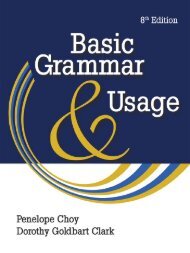HUMAN RESOURCES
check your english vocabulary for
check your english vocabulary for
You also want an ePaper? Increase the reach of your titles
YUMPU automatically turns print PDFs into web optimized ePapers that Google loves.
Appraisals (page 52) continued<br />
Many companies have adopted the practice of 360-degree appraisals. Colleagues above, below and at the same rank as the employee<br />
being appraised are asked to contribute their views on that employee before the interview takes place.<br />
If an employee is not performing well in his / her current position, s/he might be given a remedial transfer. This means that s/he is<br />
transferred to a more suitable job. The informal expression is a turkey trot.<br />
Note that many of the questions in this exercise might also be asked at an exit interview, when an employee is interviewed before s/he<br />
leaves the company. The questions would normally be expressed in the past tense, e.g., Did you think...?, Were you happy...?, etc. In<br />
addition to the questions in the exercise, exit interviews might also ask the employee how s/he felt about the rewards, benefits and<br />
services offered by the company (holiday pay, sick pay, pension scheme, health insurance, life assurance, loan facilities, educational<br />
assistance, sports and social facilities, refreshment facilities, HR services, etc).<br />
answer key<br />
Rewards and benefits 1 (pages 53 + 54)<br />
Exercise 1<br />
1. danger 2. dock 3. overtime 4. double 5. deduction 6. gross / net (net pay is often called take-home pay) 7. increment<br />
8. minimum 9. salary 10. index 11. raise (we can also say increase or hike) 12. pension (also called a superannuation scheme or<br />
plan) 13. sub (also called an advance - employees can ask for an advance on their wages / salary) 14. bonus 15. payslip<br />
16. payroll 17. deposit 18. package (also called a rewards package. This is not the same as a pay packet, which is an envelope<br />
containing an employee's wages) 19. arrears 20. weighting 21. income (the opposite of income is expenditure. Compare this<br />
with expenses, which is the money paid to someone to cover the costs of doing something in particular, e.g., paying for a hotel on a<br />
business trip).<br />
Exercise 2<br />
1. dock 2. gross / deductions 3. package 4. bonus 5. double 6. payslip 7. deposit 8. payroll 9. increment / index<br />
10. arrears / sub<br />
Rewards and benefits 2 (pages 55 + 56)<br />
Exercise 1<br />
1. direct / extrinsic 2. extrinsic / direct 3. basic 4. performance-related 5. commissions 6. recognition 7. Gainsharing<br />
8. motivation 9. production bonus 10. premium bonus 11. attendance bonus 12. acceptance bonus (informally called a golden<br />
hello) 13. Profit sharing 14. benefits 15. extras 16. pensions 17. share 18. insurance 19. duvet days 20. fixed<br />
21. flexible (also known as a cafeteria-style benefits plan) 22. Incentive 23. indirect / intrinsic 24. intrinsic / indirect 25. status<br />
26. satisfaction 27. growth / development 28. skill 29. development 30. security 31. comradeship<br />
Exercise 2<br />
1. direct or extrinsic 2. indirect or intrinsic 3. performance-related 4. false - it is extra money paid for increased productivity<br />
5. attendance bonus 6. extras 7. (d) 8. true 9. (c) 10. (a)<br />
Here are some other words and expressions that you might find useful:<br />
salaried (the adjective of salary) earnings real earnings take-home pay well-paid low-paid pay packet<br />
pension contributions occupational / company pension (scheme) portable pension (scheme) accrual rate remuneration<br />
hourly / daily rate per day / per diem a year / per annum wage / salary review increments on-target earnings parity<br />
to erode wage differentials incentive basic / flat rate broadbanding compensation package benefit in kind reward<br />
management reward review exploding bonus holiday pay sick pay health insurance life assurance perks<br />
Holidays and other time off work (pages 57 + 58)<br />
1. medical (also called a doctor's certificate) 2. statutory (SSP = statutory sick pay) 3. maternity 4. unpaid 5. gardening<br />
6. sabbatical (this word is especially used for teachers, university professors, etc, who take time away from their school or college)<br />
7. absenteeism 8. public holiday (called a bank holiday in the UK, and a legal holiday in the USA) 9. long-service 10. entitlement<br />
11. unauthorised (also spelt unauthorized. An employee who takes unauthorised leave is or goes AWOL: absent without leave)<br />
12. waiting 13. absence 14. in lieu (usually abbreviated to TOIL) 15. paternity 16. casual 17. vacation 18. benefit<br />
Letters (pages 59 + 60)<br />
Note that the sentences for each letter are in the same order as they would appear in real letters.<br />
1. B 2. D 3. E 4. B 5. C 6. D 7. A 8. C 9. B 10. F 11. B 12. C 13. D (this could also be used in E) 14. D 15. E<br />
16. A 17. F 18. G 19. E 20. G 21. C 22. E 23. A 24. A 25. B 26. - 27. D 28. G 29. E 30. F 31. F 32. A<br />
33. G 34. G 35. C 36. F<br />
Usage notes:<br />
Letters that begin with a name (e.g., Dear Mr Brown, Dear Ms Smith) end with Yours sincerely. Letters that begin with Dear<br />
Sir / Madam end with Yours faithfully.<br />
Ordinal numbers (for dates, e.g., the first of November, the seventh of April) are sometimes followed by letters (e.g., 1st<br />
November, 7th April ), but this is less common now than it used to be. 1 November, 7 April, etc, is more common.<br />
You should avoid using abbreviated dates (e.g., 12/11/05) in formal and semi-formal letters.<br />
Note that modern formal /semi-formal letters should be as brief as possible. (KISS: Keep it short and simple)<br />
You will find complete sample letters in the supplement of the Bloomsbury Dictionary of Human Resources and Personnel<br />
Management.<br />
© Bloomsbury Publishing Plc. For reference see Dictionary of Human Resources and Personnel Management (ISBN 0 7475 6623 2)<br />
75





